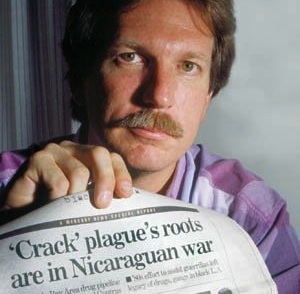How the Mainstream Press Worked with the CIA to Destroy the Journalist who linked the US Government to the sale of Crack in Inner Cities
 From [HERE] and [HERE] In 1996 – as major U.S. news outlets disparaged the Nicaraguan Contra-cocaine story and destroyed the career of investigative reporter Gary Webb for reviving it – the CIA marveled at the success of its public-relations team guiding the mainstream media’s hostility toward both the story and Webb, according to a newly released internal report.
From [HERE] and [HERE] In 1996 – as major U.S. news outlets disparaged the Nicaraguan Contra-cocaine story and destroyed the career of investigative reporter Gary Webb for reviving it – the CIA marveled at the success of its public-relations team guiding the mainstream media’s hostility toward both the story and Webb, according to a newly released internal report.
Entitled “Managing a Nightmare: CIA Public Affairs and the Drug Conspiracy Story,” the six-page report describes the CIA’s damage control after Webb’s “Dark Alliance” series was published in the San Jose Mercury-News in August 1996. Webb had resurrected disclosures from the 1980s about the CIA-backed Contras collaborating with cocaine traffickers as the Reagan administration worked to conceal the crimes.
Although the CIA’s inspector general later corroborated the truth about the Contra-cocaine connection and the Reagan administration’s cover-up, the mainstream media’s counterattack in defense of the CIA in late summer and fall of 1996 proved so effective that the subsequent CIA confession made little dent in the conventional wisdom regarding either the Contra-cocaine scandal or Gary Webb.
In fall 1998, when the CIA inspector general’s extraordinary findings were released, the major U.S. news media largely ignored them, leaving Webb a “disgraced” journalist who – unable to find a decent-paying job in his profession – committed suicide in 2004, a dark tale that will be revisited in a new movie, “Kill the Messenger,” starring Jeremy Renner and scheduled to reach theaters on Oct. 10.
The “Managing a Nightmare” report offers something of the CIA’s back story for how the spy agency’s PR team exploited relationships with mainstream journalists who then essentially did the CIA’s work for it, mounting a devastating counterattack against Webb that marginalized him and painted the Contra-cocaine trafficking story as some baseless conspiracy theory.
Crucial to that success, the report credits “a ground base of already productive relations with journalists and an effective response by the Director of Central Intelligence’s Public Affairs Staff [that] helped prevent this story from becoming an unmitigated disaster.
“This success has to be viewed in relative terms. In the world of public relations, as in war, avoiding a rout in the face of hostile multitudes can be considered a success. … By anyone’s definition, the emergence of this story posed a genuine public relations crisis for the Agency.” [As approved for release by the CIA last July 29, the report’s author was redacted as classified, however, Ryan Devereaux of The Intercept identified the writer as former Directorate of Intelligence staffer Nicholas Dujmovic.]
According to the CIA report, the public affairs staff convinced some journalists who followed up Webb’s exposé by calling the CIA that “this series represented no real news, in that similar charges were made in the 1980s and were investigated by the Congress and were found to be without substance. Reporters were encouraged to read the ‘Dark Alliance’ series closely and with a critical eye to what allegations could actually be backed with evidence. Early in the life of this story, one major news affiliate, after speaking with a CIA media spokesman, decided not to run the story.” [MORE]